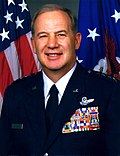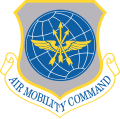United States Air Force Expeditionary Center
 From Wikipedia - Reading time: 8 min
From Wikipedia - Reading time: 8 min
This article contains promotional content. (February 2017) |
| United States Air Force Expeditionary Center | |
|---|---|
 United States Air Force Expeditionary Center emblem | |
| Active | 1 May 1994 – present |
| Country | United States |
| Branch | United States Air Force |
| Role | Education and Training |
| Garrison/HQ | Air Mobility Command |
| Website | www |
| Commanders | |
| Commander | Brig Gen Stephen P. Snelson |
| Vice Commander | Col Scott M. Wiederholt |
| Command Chief | CMSgt Dennis W. Fuselier |
The United States Air Force Expeditionary Center is a United States Air Force training center located at Fort Dix, New Jersey which specializes in combat support and global mobility training and education'.[1]
Overview
[edit]Located on the Fort Dix entity of Joint Base McGuire–Dix–Lakehurst, N.J., the center has direct oversight for end route and installation support, contingency response and partner capacity-building mission sets within the global mobility enterprise. The center provides administrative control for six wings and two groups within Air Mobility Command, including the 87th Air Base Wing and the 621st Contingency Response Wing on the McGuire AFB entity of Joint Base McGuire-Dix-Lakehurst, the 319th Air Base Wing at Grand Forks AFB, N.D.; the 515th Air Mobility Operations Wing at Joint Base Pearl Harbor-Hickam, Hawaii; the 521st Air Mobility Operations Wing at Ramstein AFB, Germany; the 628th Air Base Wing at Joint Base Charleston, S.C.; the 43d Air Mobility Operations Group at Pope Field, N.C.; and 627th Air Base Group at Joint Base Lewis-McChord, Wash.
The Expeditionary Operations School at the Expeditionary Center offers 92 in-residence courses and 19 web-based training courses, graduating more than 40,000 students annually. Courses include the Air Force Phoenix Raven Training, Advanced Study of Air Mobility and Aerial Port Operations Course.
Both the 87th Air Base Wing and the 628th Air Base Wing are Air Force lead organizations on joint bases that host AMC flying units, along with other Department of Defense partners.[2] The 43d Air Mobility Operations Group and 627th Air Base Group partner with the U.S. Army,[3] while the 319th Air Base Wing supports the Department of Homeland Defense and Air Combat Command emerging missions.
The 515th and 521st AMOWs, along with the 621st CRW, are responsible for end route and combat support, contingency response and partner capacity-building mission sets[clarification needed] around the globe.
History
[edit]The U.S. Air Force Expeditionary Center, formerly known as the Air Mobility Warfare Center, was established on May 1, 1994, with an official mission assigned on October 1 of the same year. Initially offering a variety of courses, from combat readiness exercises to cargo and passenger transportation training, the center played a pivotal role in enhancing the capabilities of the Air Mobility Command.
The center underwent a name change on March 4, 2007, becoming the U.S. Air Force Expeditionary Center. Subsequently, on January 7, 2011, the center's scope was expanded to encompass additional responsibilities related to the evolving mission sets of the Air Mobility Command. Further expansion occurred in the spring of 2012 when the center assumed administrative control over three additional air wings, including the sole Contingency Response wing within the Air Force.[1]
USAF Expeditionary Operations School
[edit]The USAF Expeditionary Operations School (“EOS”) of the USAF Expeditionary Center, is for mobility and expeditionary operations skills training and Air Mobility Command's provider of support to the mobility enterprise.
The EOS offers a variety of training, from combat support to logistics. The EOS is responsible for advanced leadership training, including Advanced Studies of Air Mobility Course and the Director of Mobility Forces Course.0
The EOS offers 74 in-resident courses and graduates approximately 40,000 students per year from the Expeditionary Center main campus at ASA Fort Dix, Joint Base McGuire-Dix-Lakehurst, N.J., from the mobile training team class and from detachments Hurlburt Air Force Base, Fla., and Scott Air Force Base, Ill.[citation needed][4]
List of commanders
[edit]| No. | Commander | Term | |||
|---|---|---|---|---|---|
| Portrait | Name | Took office | Left office | Term length | |
| 1 | Brigadier General William J. Begert | 1 October 1994 | 14 April 1995 | 195 days | |
| 2 | Major General Richard C. Marr[5] | 14 April 1995 | 21 August 1997 | 2 years, 129 days | |
| 3 | Major General William Welser III[6] | 21 August 1997 | 5 August 1999 | 1 year, 349 days | |
| 4 | Major General Silas R. Johnson[6] | 5 August 1999 | 2 June 2000 | 302 days | |
| - | Colonel John C. Scherer Acting | 2 June 2000 | 16 June 2000 | 14 days | |
| 5 | Major General Robert J. Boots[7] | 16 June 2000 | 26 July 2002 | 2 years, 40 days | |
| 6 | Major General Christopher A. Kelly[8] | 26 July 2002 | 12 May 2005 | 2 years, 290 days | |
| 7 | Major General David S. Gray[9] | 12 May 2005 | 23 May 2007 | 2 years, 11 days | |
| 8 | Major General Kip L. Self[10] | 23 May 2007 | 19 October 2009 | 2 years, 149 days | |
| 9 | Major General Richard T. Devereaux | 19 October 2009 | 2 October 2010 | 348 days | |
| 10 | Major General William J. Bender[11] | 2 October 2010 | 29 July 2013 | 2 years, 300 days | |
| - | Brigadier General Randall C. Guthrie[12] Acting | 29 July 2013 | 9 September 2013 | 42 days | |
| 11 | Major General Frederick H. Martin[13] | 9 September 2013 | 2 August 2016 | 2 years, 328 days | |
| 12 | Major General Christopher Bence[14][15] | 2 August 2016 | 9 August 2018 | 2 years, 7 days | |
| 13 | Major General John R. Gordy[16] | 9 August 2018 | 23 September 2020 | 2 years, 45 days | |
| 14 | Major General Mark Camerer[17][18] | 23 September 2020 | 17 August 2022 | 1 year, 328 days | |
| 15 | Major General John M. Klein Jr. | 17 August 2022 | 12 July 2024 | 1 year, 330 days | |
| 16 | Brigadier General Stephen P. Snelson | 12 July 2024 | Incumbent | 340 days | |
References
[edit]- ^ a b "About Us". U.S Air Force Expeditionary Center. 14 June 2023. Retrieved 14 June 2023.
- ^ "Units". www.amc.af.mil. Retrieved 14 May 2022.
- ^ "43d Air Mobility Operations Group". U.S. Air Force Expeditionary Center. Retrieved 14 May 2022.
- ^ "USAF Expeditionary Operations School". Retrieved 23 October 2024.
- ^ "Major General Richard C. Marr".
- ^ a b "Major General Silas R. "Si" Johnson Jr".
- ^ "Major General Robert J. Boots".
- ^ "Lieutenant General Christopher A. Kelly".
- ^ "Major General David S. "Scott" Gray".
- ^ "Major General Kip L. Self".
- ^ "Lieutenant General William J. "Bill" Bender".
- ^ "Brigadier General Randall C. "Arlo" Guthrie".
- ^ "Major General Frederick H. "Rick" Martin".
- ^ "Major General Christopher J. Bence".
- ^ "USAFEC welcomes new commander".
- ^ "MAJOR GENERAL JOHN R. GORDY II > Air Force International Affairs > Display". Archived from the original on 2 February 2021. Retrieved 28 January 2021.
- ^ "U.S. Air Force Expeditionary Center welcomes new commander".
- ^ "Major General Mark D. Camerer".
External links
[edit]![]() This article incorporates public domain material from the United States Air Force
This article incorporates public domain material from the United States Air Force
 KSF
KSF
![Richard C. Marr[5]](https://upload.wikimedia.org/wikipedia/commons/thumb/3/32/Maj_Gen_Richard_C._Marr.jpg/120px-Maj_Gen_Richard_C._Marr.jpg)
![William Welser III[6]](https://upload.wikimedia.org/wikipedia/commons/thumb/4/43/Lt_Gen_William_Welser_III.jpg/120px-Lt_Gen_William_Welser_III.jpg)
![Silas R. Johnson[6]](https://upload.wikimedia.org/wikipedia/commons/thumb/7/78/Maj_Gen_Silas_R._Johnson.jpg/120px-Maj_Gen_Silas_R._Johnson.jpg)

![Robert J. Boots[7]](https://upload.wikimedia.org/wikipedia/commons/thumb/6/65/Maj_Gen_Robert_J._Boots.jpg/120px-Maj_Gen_Robert_J._Boots.jpg)
![Christopher A. Kelly[8]](https://upload.wikimedia.org/wikipedia/commons/thumb/5/5f/Lieutenant_General_Christopher_A._Kelly.jpg/120px-Lieutenant_General_Christopher_A._Kelly.jpg)
![David S. Gray[9]](https://upload.wikimedia.org/wikipedia/commons/thumb/f/fc/Maj_Gen_David_S._Gray.jpg/120px-Maj_Gen_David_S._Gray.jpg)
![Kip L. Self[10]](https://upload.wikimedia.org/wikipedia/commons/thumb/f/fe/Maj_Gen_Kip_L._Self.jpg/120px-Maj_Gen_Kip_L._Self.jpg)

![William J. Bender[11]](https://upload.wikimedia.org/wikipedia/commons/thumb/6/66/LIEUTENANT_GENERAL_WILLIAM_J._BENDER.JPG/120px-LIEUTENANT_GENERAL_WILLIAM_J._BENDER.JPG)
![Randall C. Guthrie[12]](https://upload.wikimedia.org/wikipedia/commons/thumb/8/83/Brig_Gen_Randall_C._Guthrie.jpg/120px-Brig_Gen_Randall_C._Guthrie.jpg)
![Frederick H. Martin[13]](https://upload.wikimedia.org/wikipedia/commons/thumb/c/cf/Frederick_H._Martin.jpg/120px-Frederick_H._Martin.jpg)
![Christopher Bence[14][15]](https://upload.wikimedia.org/wikipedia/commons/thumb/0/0b/Maj_Gen_Christopher_J._Bence_%282%29.jpg/120px-Maj_Gen_Christopher_J._Bence_%282%29.jpg)
![John R. Gordy[16]](https://upload.wikimedia.org/wikipedia/commons/thumb/3/37/John_R._Gordy_II_%282%29.jpg/120px-John_R._Gordy_II_%282%29.jpg)
![Mark Camerer[17][18]](https://upload.wikimedia.org/wikipedia/commons/thumb/f/fd/Maj_Gen_Mark_D._Camerer_%282%29.jpg/120px-Maj_Gen_Mark_D._Camerer_%282%29.jpg)


